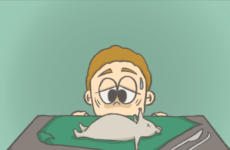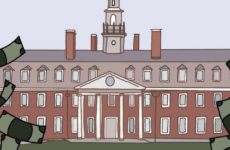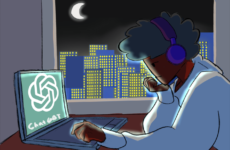Welcome, ladies and gentlemen, to Choate’s version of the First Church of Progressivism and its very secular and sexual sacraments.
Over the past year, Americans have been witness to a vast amount of social change, from the legalization of gay marriage to the opposition of North Carolina’s “bathroom bill” to the battle against “hate speech” on university campuses. Choate has likewise embraced an agenda of academic leftism, dedicating special programs last year to advancing liberalism, notably propagating one-sided coverage of racial relations by bringing in advocates to deliver progressive platitudes on “white privilege” and Black Lives Matter.
Last week, I witnessed two performances that rank among the most appalling things I have ever seen: SLUT: The Play and Now That We’re Men: A New Play. Both plays reduced today’s teenagers and their “culture” into unrealistic stereotypes that many Choate students would struggle to fit into.
It was a slap in the face to the students at Choate who dedicate their time here to advancing their education; that is, those who engage in learning that involves exploring things outside their own identities, not having and thinking about sex every five minutes.
I understand that the plays were meant to spark discussion in a variety of directions, but here are several aspects of them that I find particularly irksome. The School has been parading the issue of “consent” since students arrived on campus a month ago. Supposedly, these performances would increase awareness about this important issue. But this theme was glossed over, and during the post-show Q&A, the director Katie Capiello herself explained that the message is to create some sort of “sexual revolution,” where sex is deemed a beneficial expression of freedom.
I disagree with the notion that such an idea will benefit the school community. We can look to the current climate on college campuses, where sexual assault is an epidemic. Colleges have become more sexualized than ever, and the result is terrifying. Encouraging self-restraint is deemed repressive, and schools have themselves off from the criminal-justice system and administrators ignore due process. These administrators have created judicial legal systems that often allow actual rapists to avoid legal punishment, the massive scandal at UVA being a notable example, among others.
Perhaps even more mind-numbing than sending mixed messages about a sexual free-for-all was the playwright’s suggestion that the current legal system is broken because rape cases aren’t afforded some type of judicial preference. In an appeal to ignorance, the writer of the play stated that rape cases aren’t brought to trial because prosecutors feel that if they lose it will hurt their chances for promotion. But in truth most rape cases are extraordinarily difficult to prosecute and seldom reported. It is often very difficult for the prosecution to meet their burden of proof with only two witnesses: the victim and the defendant. This is an unfortunate and tough reality.
Choate seems to favor these types of special programs — despite the fact that some students find their messages totally off the mark — which speaks to the larger issue of campus progressivism being constantly shoved down our throats. This liberalism has almost turned into a quasi-religion. What Choate is saying is that extraverted liberal students are always in the right, everyone else is always in the wrong, and if one doesn’t step to the beat of monolithic, progressive thinking, one has no place in this community.




